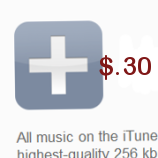You’re a savvy shopper, a well-educated consumer. You know to shop around to look for the best price on something before you fork over your cash. And after doing all your homework, you find out from Facebook that a friend on the other side of the country got the same item from the same website for less than you just paid. Why? How? Because an algorithm decided how much each of you should pay, and there’s nothing you can do about it. [More]
variable pricing

Why Is It So Hard To See What’s Inside The “Black Box” Determining What Prices You Get Online?

69 Cent Tracks Are Hard To Find On iTunes Music Store
MP3newswire.net browsed through not-quite-hits from past decades on the iTunes Music Store to see where these fabled 69 cent music tracks are hiding. He tried the Katydids, Camper Van Beethoven, the Lyres, Rock and Roll Trio, but found nothing below 99 cents. Then he went back to be-bop and blues recordings of the ’40s—nope. Finally, he looked at songs from Ada Jones, a recording artist from 1893 to 1922. Everything was still 99 cents.

iTunes Raises Prices To $1.29 For Popular Music Tracks
Say what you will about Apple’s dominion over the music industry, but for a while now they’ve maintained an artificially low market for music tracks by forcing labels to sell songs for 99 cents each. That era is over: in exchange for moving to a higher bitrate and going 100% DRM free (hooray) iTunes has officially introduced “variable pricing” (boo), which means each track may cost 69 cents, 99 cents, or $1.29—it all depends on the song and the label. It looks like Amazon has introduced variable pricing as well, although it’s mostly holding to the 99 cents threshold for now. Amazon’s tracks, by the way, have always been free of DRM.

